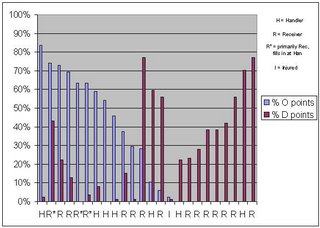REQUEST: If you have subbing sheets for your team at Nationals, please contact me if you'd be willing to share them (after anonymizing).
At Nationals this year, DoG had the flattest playing time profile I’ve ever seen. Only one guy played more than ¾ of the O points, and even he was only at 83% (sitting out about 2 O points per game). In contrast, vintage DoG and practically all the top teams now have several guys who more or less played every O point.
Here’s the graph. Although not necessary for the purposes of this discussion, players are categorized as Handlers, Receivers, or Receivers who played handler if necessary.


Some points:
- Lots of guys didn’t play any O; only me and Al didn’t play any D.
- The top 7 O played only 2/3 of the time, leaving an average of 2+ guys on the line each point who weren’t considered starters.
- D % played is less (7th most is less than 50%).
- Only 3 or 4 guys got more than a token amount of points on both sides.
- Although this is averaged over all games, and you would suspect that the numbers would be different for tough vs easy games, DoG didn’t have any easy games at Nationals last year, and there was no real difference between relatively easy and relatively tough. There were about an equal number of O and D points.
Some of this is obviously do to a flatter talent level, which unfortunately is probably due to us not having the players who would be selected to an All-Nationals team, rather than having every player be that way. I found it hard to sit out so much and then try to take on an important role when in. The flat profile means that there are only a couple real starters (and even they are barely so) and everyone else is a sub. Ego has to be part of an offensive player's package, and being handled as subs destroys that ego. To belabor the point, starters do not merely play more than subs, but they do more when they are in. By telling each player that he is a sub, the team also tells them that they aren't good enough to be the man when he is in the game. Equally importantly, the player has to draw one of the following conclusions, depending on how the subbing is done: either whatever I do has little effect on my playing time, in which case I don’t have to play smart, or I am going to be benched if I make a mistake, in which case I probably should play so conservatively that I’m not going to help the team.